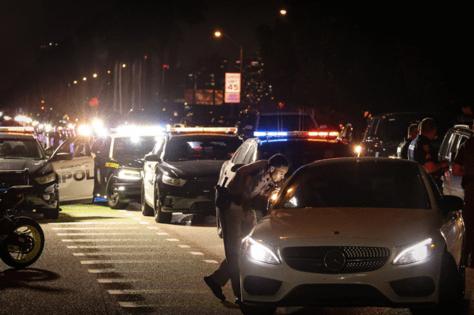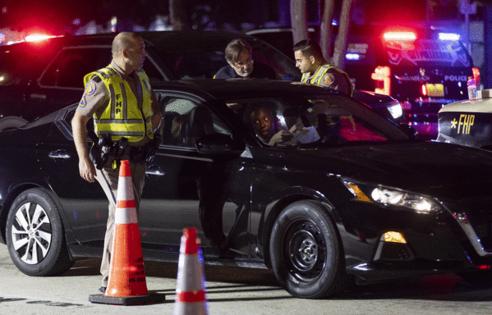How Florida is telling highway troopers to hold, detain immigrants wanted by the feds
Published in News & Features
TALLAHASSEE, Fla. — Florida troopers patrolling the state’s roadways are being told to arrest and jail undocumented immigrants on offenses like driving without a valid driver’s license as a way to help push more people on the path to deportation, according to state guidelines obtained by the Miami Herald/Tampa Bay Times.
“Every effort should be made to take the subject into custody and deliver them to a county jail,” Bill Milton, the chief attorney for the Florida Highway Patrol, wrote in the March 6 memo.
The previously unreported guidelines also say troopers can detain people who are not suspected of committing a crime for up to an hour, an amount of time that raises questions about potential violations of a person’s constitutional protection against unreasonable seizure.
The legal guidance lays out how the state is telling troopers they must handle encounters with immigrants who are wanted by U.S. Immigration and Customs Enforcement while they remain without the federal authority to carry out immigration arrests.
It also shows how the state agency — whose mission is to create a safe driving environment in Florida — is trying to make headway in how it can help in President Donald Trump’s immigration crackdown, even as the federal government is slow to grant troopers the federal authority they are seeking to more directly participate in federal immigration enforcement efforts.
Gov. Ron DeSantis last month said state troopers who are granted federal authority would be able to help “assist with deportations.” Dave Kerner, the executive director for the state agency, said troopers would be able to arrest immigrants who are in the country illegally during traffic stops, even in cases when they are not committing a crime.
On March 19, the Highway Patrol said there were 815 troopers that had been trained for the federal program known as 287(g) that allows them to stop, question and arrest people who are suspected to be in the country illegally. The state agency has declined to say how many have been federally certified and deputized to participate in the program.
A source familiar with the training told the Herald/Times the number of trained troopers has since grown to about 1,100, but none of them have been federally certified yet.
As they wait, the state is making clear to troopers that they do not have the authority to carry out immigration arrests. But troopers can arrest and jail individuals if there is probable cause that they committed another crime, such as driving without a valid driver’s license, reckless driving or an outstanding criminal warrant, according to the guidance.
Once a person is booked into jail, troopers are told they must alert jail personnel that the individual is wanted by ICE — a step that could make it easier for correctional officers to process people who are slated for deportation.
A spokesperson for the Florida Highway Patrol did not respond to questions about the guidance.
State guidance raises red flags
When Florida troopers make a traffic stop, they have access to a national crime database that is meant to help them confirm whether an immigrant is wanted by federal immigration authorities.
In the memo, Milton notes the Trump administration recently entered the information of approximately 700,000 individuals with civil immigration warrants into the national database in an effort to “maximize illegal immigration enforcement and removal operations.”
It is because of this database that Florida troopers can check whether someone they stopped is wanted by ICE. The problem is that they can’t act on that information alone because they do not have the federal authority yet, Milton writes.
“These are civil warrants… not criminal warrants,” Milton writes. “At present, troopers have no authority to enforce them.”
Milton, however, is not asking troopers to disregard the information. Instead, he says troopers should take the information into account during traffic stops, even in cases when the person is not suspected of committing a crime.
In those scenarios, troopers are being told they can hold the individuals for up to an hour as they wait for a federal immigration agent to come and pick them up, according to the memo. If a federal immigration agent does not arrive within an hour, troopers should “gather as much personal information available, including all residence and work information,” and then release the person.
The wait time is now raising concerns among some immigrant advocates who say holding a person for an hour without reasonable suspicion of a crime is a violation of their Fourth Amendment rights, which protect individuals from unreasonable searches and seizures.
“Prolonging a traffic stop without reasonable suspicion of a crime is a violation of the 4th Amendment,” Alana Greer, the director for the advocacy group, Community Justice Project, said in a text message. “The Supreme Court has rules that adding even ‘seven or eight minutes’ to a stop is too much.”
Greer is referencing a 2015 Supreme Court ruling that limited the duration of a traffic stop to the time needed to address the initial traffic violation. The ruling stemmed from a traffic stop in Nebraska, where the officer completed the necessary tasks for the initial stop but then detained the driver for seven to eight minutes to wait for a drug-sniffing dog to inspect the vehicle.
A lower court initially said the delay was acceptable, but the Supreme Court disagreed and underscored that a “reasonable time” for the stop should be tied to the stop’s mission and that adding time to the stop would be justified if there is reasonable suspicion of another crime.
It’s unclear how FHP’s chief attorney concluded that a reasonable time for a traffic stop, where a person is not suspected of committing a crime, should be up to an hour.
But in the memo, Milton writes that “while courts vary on what a ‘reasonable time’ period is, troopers should limit any such wait to no more than one hour from the time of initial contact.”
Amy Fettig, the co-executive director for Fair and Just Prosecution, said the directive is a “waste of time” for a trooper.
“A whole hour? For something that has nothing to do with public safety?” Fettig said. “They’re basically burning local resources to curry favor with the federal government.”
Fettig worries that troopers are being asked to divert their time away from more serious crimes, in order to appease a political agenda.
“Let’s get real about what the community is actually afraid of,” she said. “It’s not a mom driving without a license. It is somebody walking around with a gun and holding you up.”
©2025 McClatchy Washington Bureau. Visit at mcclatchydc.com. Distributed by Tribune Content Agency, LLC.










Comments